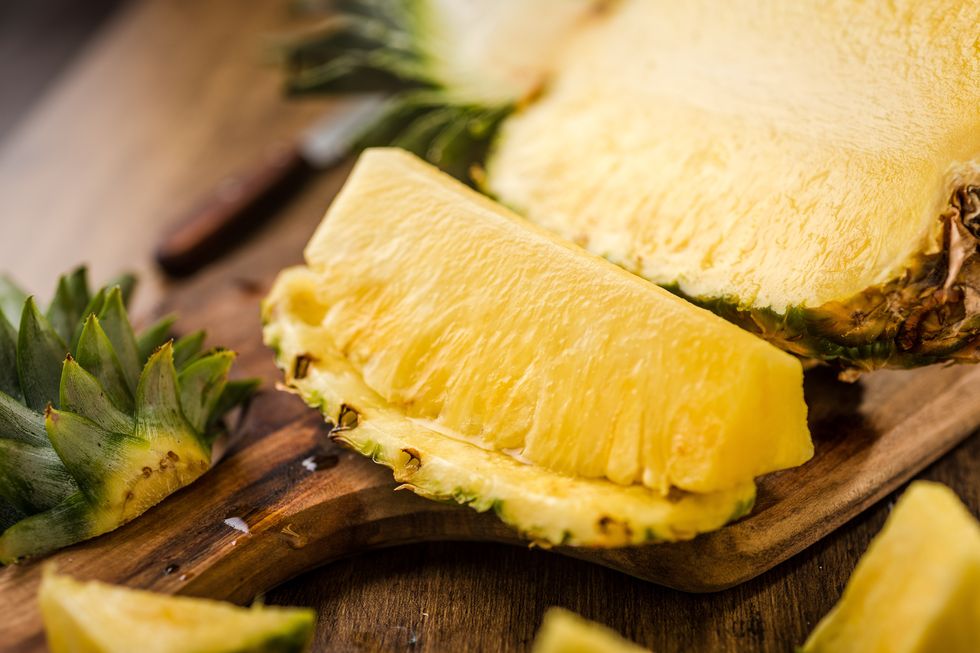I’m standing in my kitchen with the fridge doors wide open, looking – rather gormlessly – at what I can eat when it’s boiling outside. There’s no way I’m using the oven in this hot weather, and, to be honest, I don’t really want to be stood over a hot stove either.
‘What to eat in hot weather’ is one of those evergreen Google searches we all furiously type into our phones when the UK is graced with a rare summer heatwave. Slow-cooked meals and one-pan oven dishes are out, and crisp salads, fruit bursting with flavour, and fresh vegetables are in.
But what foods are the most hydrating? And what drinks are best to have on tap during a heatwave?
Bex Prade, clinical nutritionist and functional medicine practitioner, offers us some of her do’s and don’ts when it comes to what to eat – and drink – during a heatwave…
What to eat in hot weather?
Pineapple
‘It might not make you “feel” cool the way that mint can, but pineapple contains the super powerful anti-inflammatory property, bromelain,’ explains Prade. ‘This helps your body combat the effects of heat and inflammation. This water-rich fruit also helps you stay hydrated which can help regulate your body temperature.’
Cooling Herbs
Coriander: has been associated with improved digestion and heat tolerance, explains Prade.
Lemon balm: ‘A herb from the mint family is a popular choice for combating heat stress,’ she says. ‘Research indicates that lemon balm may promote relaxation and reduce anxiety, which can contribute to overall comfort in hot weather.’
Fennel: traditionally used to cool the body to aid digestion. ‘Rich in antioxidants and essential oils, fennel may help alleviate symptoms of heat-related discomfort such as bloating and indigestion,’ she adds.
Hydrating foods
To avoid dehydration and the possibility of heat stroke, Prade suggests eating fruits and vegetables that are particularly hydrating, since they have a high water content and contain valuable electrolytes, which help you maintain fluid balance, keep blood pressure levels stable and help with nerve signalling.
Hydrating Fruits: Strawberries, papaya, mangoes, watermelon, honeydew, cantaloupe: These juicy fruits make great yoghurt toppings, and can be added to salads or to sparkling water for a fizzy, refreshing drink.
Hydrating Vegetables: Cucumbers, radishes, celery, zucchini, peppers: Add these crispy vegetables to your salads, or pair them with hummus for a satisfying, hydrating snack.
What to drink in hot weather?
Mint
‘Peppermint and spearmint are among the most popular cooling herbs, thanks to the presence of menthol in these plants that has a naturally chilling effect,’ explains Prade. ‘Try infusing water with mint or adding some chopped sprigs to a bright, summery salad of strawberries and nectarines. Even chewing a few mint leaves can help take the edge off of those hot summer afternoons.’
Coconut water
‘Coconut water has natural cooling properties that can help regulate body temperature and reduce heat stress,’ says Prade. ‘The electrolytes in coconut water also help the body stay hydrated on hot days. Add chunks of fruit like strawberries or pineapple to coconut water or add to smoothies. You can also use these to make non-alcoholic mocktails.’
Green tea
‘Green tea is cooling and rich in antioxidants, particularly catechins, which can help reduce body temperature and provide a cooling effect,’ she says. ‘The compounds in green tea can help regulate metabolism and reduce heat production in the body, which can make you feel cooler. To maximize the cooling effects, green tea can be enjoyed chilled with mint leaves.’
Hibiscus
Hibiscus is also valued for its cooling properties. ‘Studies suggest that consuming hibiscus tea may help regulate body temperature and promote hydration, making it a great summer drink. It tastes great chilled too,’ adds Prade.
What to avoid in hot weather?
Fizzy drinks, alcohol and caffeine
We all love a Diet Coke, a glass of ice-cold rosé and an iced latte to-go when it starts to heat up, but sadly, these are the best drinks to rehydrate with. ‘It’s important to prevent dehydration by avoiding the consumption of sugary, sweetened drinks, alcohol and caffeine,’ says Prade. ‘All of these dehydrating beverages cause increased urination and electrolyte loss.
‘And beware, although sports drinks are marketed to keep you hydrated during physical activity, many of these products contain lots of added sugars and synthetic flavourings, so opt for natural electrolytes instead.’
Cut through the noise and get practical, expert advice, home workouts, easy nutrition and more direct to your inbox. Sign up to the WOMEN’S HEALTH NEWSLETTER









